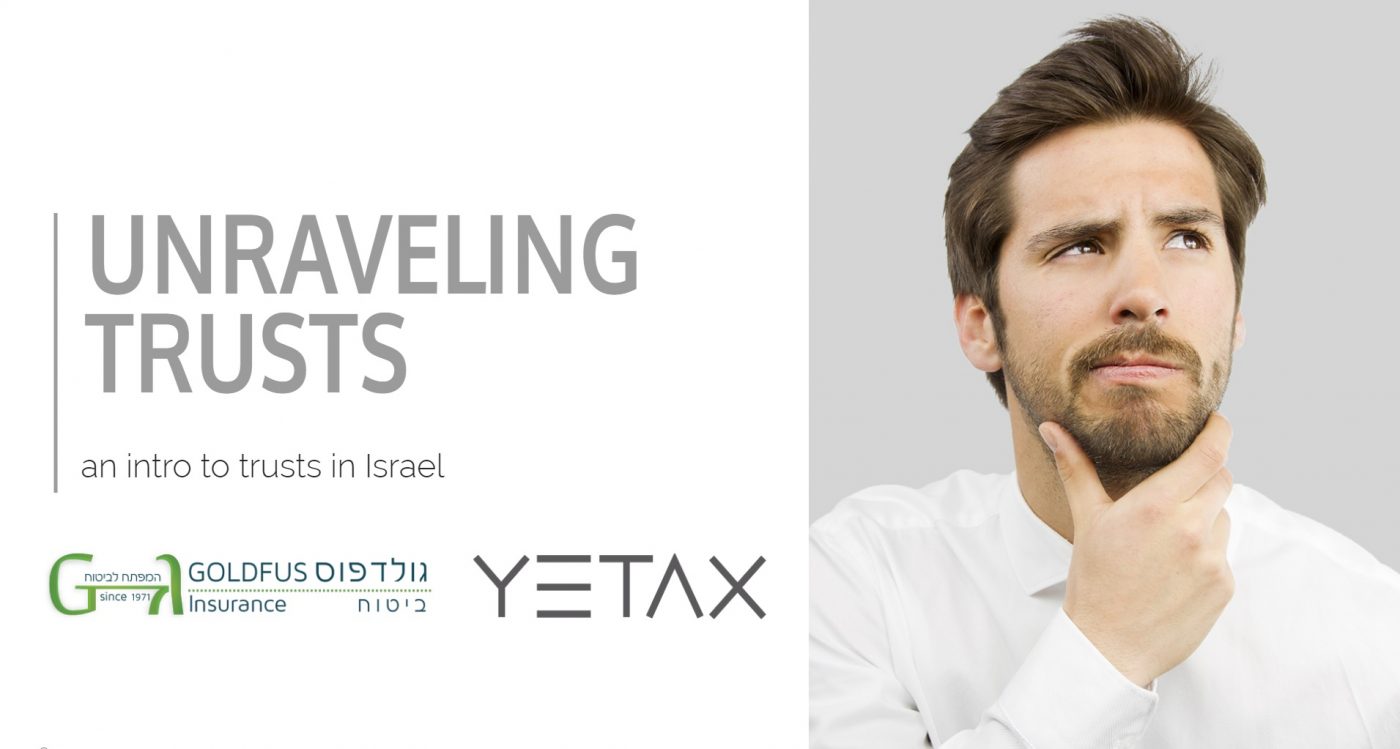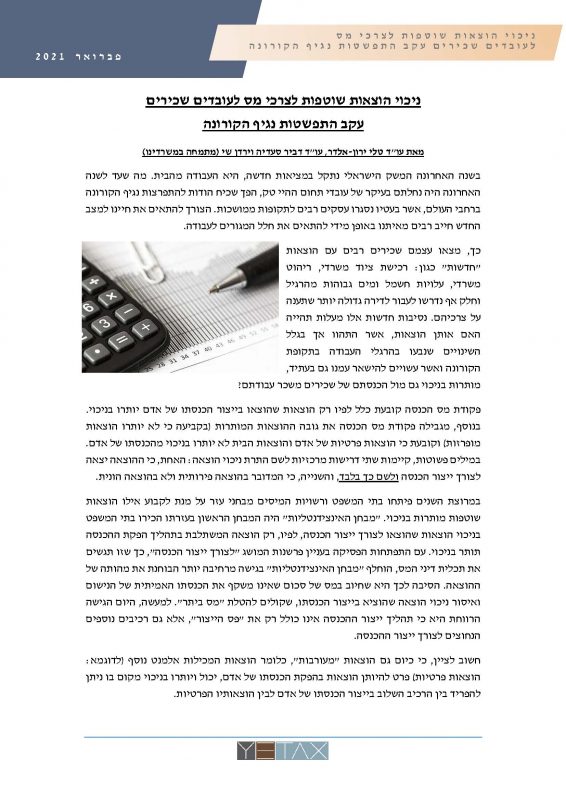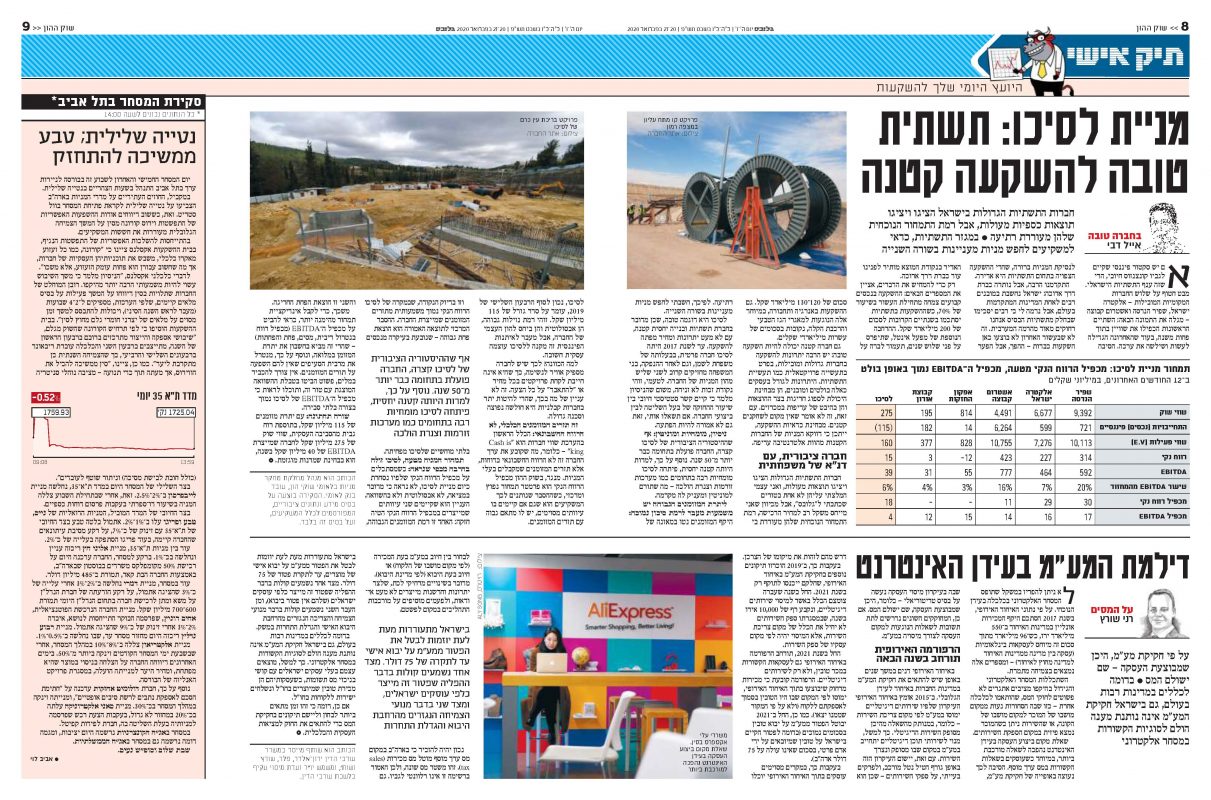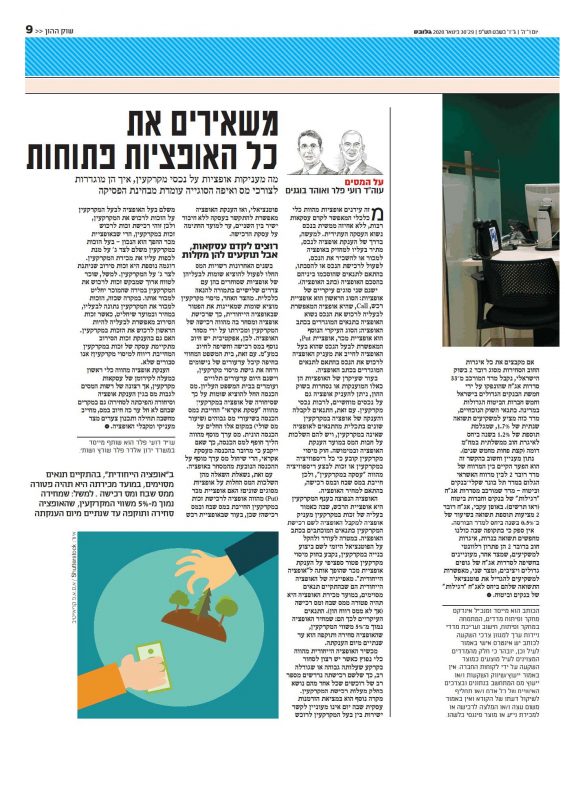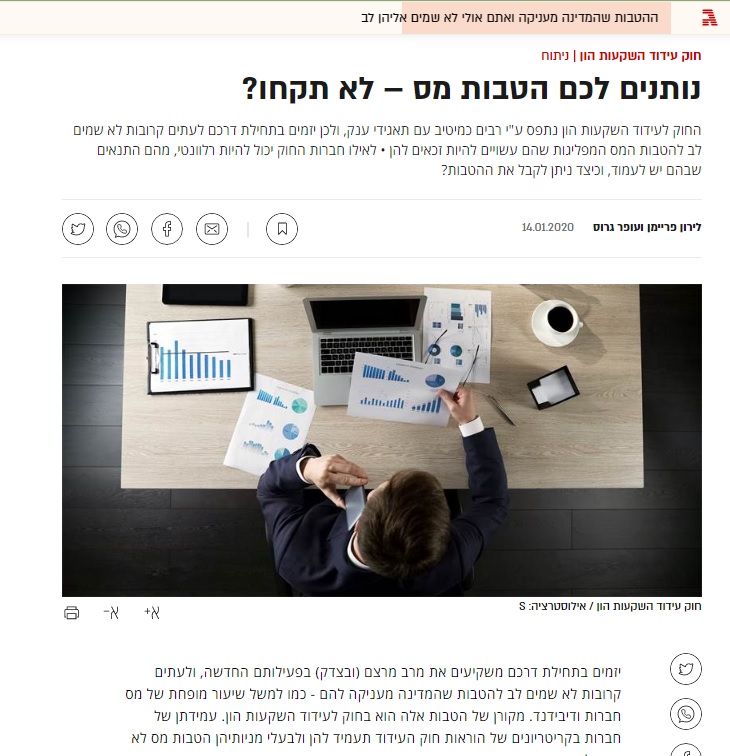עדכון לקוחות – מתווה פיצויים "עם כלביא" שאושר במליאת הכנסת בתאריך 21.7.2025
המתווה יכלול:
מסלול פיצויים בגין נזק עקיף – בהתבסס על שיעור הירידה במחזור העסקאות ושכר העובדים בחודש יוני, בדומה למתווה הפיצויים של "חרבות ברזל" שיושם בעבר.
פיצוי על אובדן שכר דירה למשכירים פרטיים בעקבות נזק ישיר שנגרם לנכס.
פיצוי נוסף לעסקים שנפגעו מנזק ישיר באופן מתמשך – עסקים שספגו נזק למבנה, מלאי או ציוד עסקי כתוצאה מהמלחמה, והושבתו לתקופה מסוימת, זכאים לפיצוי נוסף.
הרחבה של הזכאות לדמי אבטלה – קוצרה תקופת האכשרה כפי שתוכנן במקור ובוטלה החובה לנצל ימי חופש טרם היציאה לחל"ת.
מקדמות של 60% מהפיצוי תוך 21 יום ממועד הגשת התביעה – ובמקרים מסוימים אף תוספת של 10% לאחר 150 יום.
החמרת הסנקציות על הגשת תביעות שווא – כולל קנסות בגובה עד 40% מהפער.
זה הזמן – כל עסק שנפגע בתקופת הלחימה מוזמן להתייעץ עימנו ולבחון את זכאותו לפיצוי.
ליצירת קשר בנושא –
סיון הניק – sivan@yetax.co.il
אורי סטנסקו – ori@yetax.co.il
________________________________________________________________
עדכון לקוחות בעקבות דיוני ועדת הכספים של הכנסת מיום 6.7.2025 – פיצוי לעסקים שנפגעו במהלך מבצע "עם כלביא"
ועדת הכספים של הכנסת דנה אתמול בהצעת חוק חדשה שמטרתה להסדיר מתווה פיצויים ארצי לעסקים שנפגעו בעקבות מבצע "עם כלביא".
המתווה מתבסס על מודל הפיצויים ממבצע "חרבות ברזל", עם התאמות לרוח התקופה ולמאפייני הלחימה מול איראן.
מה כולל המתווה?
- מענק "המשכיות עסקית" לעסקים קטנים ובינוניים, המחושב לפי ירידה במחזור והוצאות קבועות.
- עסקים עם מחזור שנתי של עד 400 מיליון ש"ח, שחוו ירידה של מעל 25% (או 12.5% למדווחים דו-חודשי), יהיו זכאים לפיצוי.
- עצמאים עם מחזור של עד 300 אלף ש"ח יוכלו לקבל סכום פיצוי קבוע לפי עומק הפגיעה.
- ההתחייבות: הכספים יועברו תוך 3 ימי עסקים מרגע הגשת הבקשה, החל מה-15 ביולי.
ומה לגבי נזקים מתמשכים?
עסקים שנפגעו פיזית (למשל מפגיעות טילים) יזכו להחזר הוצאות תפעוליות למשך חצי שנה, אך נרשמה דרישה להרחיב את הפיצוי כך שיכסה גם אובדן הכנסה בפועל – עד לסיום שיפוצים או מעבר למיקום חלופי. כמו כן, נבחנת האפשרות להחיל את ההסדר גם על עסקים שנפגעו חלקית, ולא רק כאלה שנסגרו לחלוטין.
מה עוד עומד על הפרק?
- הועלתה דרישה לאפשר לעסקים לבחור את שנת הבסיס להשוואה (2023 או 2024), לפי מה שמיטיב עמם.
- מתקיים דיון בנוגע לעובדים שחזרו במהירות לעבודה – ושכרגע אינם עומדים בתנאי הזכאות לחל"ת.
- נבחנים פתרונות עבור אוכלוסיות נוספות, כולל נשות מילואימניקים בעלות עסקים, מפונים, עצמאיות אחרי לידה, ועוד.
המלצתנו בשלב זה:
תתחילו להיערך להגשת הבקשה לפיצוי – לאסוף נתונים על ירידה במחזורים, הוצאות קבועות, מסמכים לנזקים פיזיים, ודוחות רלוונטיים.
________________________________________________________________
החודש מדינת ישראל סיימה את אחד מאירועי הלחימה הגדולים בתולדותיה בתחושת ניצחון גדולה.
אך לצד האיום הביטחוני שהוסר לעת עתה, ממשיך להתחולל משבר כלכלי עמוק בעורף. כאשר אלפי משפחות, בעלי נכסים ועסקים ספגו פגיעה כלכלית קשה.
כדי לסבר את האוזן, הנזקים הכלכליים של המערכה שנגרמו בפרק הזמן הקצר יחסית שבו התנהלה, הם כמעט זהים בהיקפם לאלה שנגרמו במהלך כל מלחמת חרבות ברזל!
בתגובה לנזקי הלחימה הקשים, הופעלו מנגנוני סיוע לאומיים, ובראשם קרן הפיצויים של רשות המיסים – מי שמהווה כיום הגוף המרכזי לפיצוי בגין נזקי מלחמה.
יש שני סוגי פיצוי עיקריים להם זכאים נפגעים –
- פיצוי בגין נזק ישיר, כלומר נזקים שנגרמו באופן ישיר מפעילות לחימה או פעולת איבה (כגון הרס מבנה ו/או תכולה כתוצאה מפגיעת טיל).
- פיצוי בגין נזק עקיף, כלומר נזקים שנגרמו באופן אגבי לפעילות לחימה או פעולת איבה (כגון אובדן הכנסות שנובע מהשבתת המשק).
נזק ישיר – מה חשוב לדעת?
ניתן להגיש תביעה בגין נזק ישיר שנגרם למבנים, רכבים, ציוד, מלאי ותכולת דירה, אבל חשוב לציין – אין שום כיסוי לחפצי ערך כגון תכשיטים, מזומנים, עתיקות וחפצי אמנות!
קיימים שני מסלולי תביעה אפשריים: מסלול מהיר (שהורחב לאחרונה עד לתקרה של 30,000 ₪) ומסלול רגיל (בכפוף להערכת שמאי ו/או לתקרות פיצוי משתנות בהתאם חוק).
הגשת תביעה מתבצעת באתר רשות המיסים, ודורשת תיעוד מלא: תמונות, הצהרה, ולעיתים גם חשבוניות והצעות מחיר אם הנזק בר תיקון.
במסלול הרגיל, תשלום הפיצוי נעשה בכפוף להערכת שמאי, בעוד תביעות במסלול המהיר מתבררות לרוב תוך 7 ימים ודורשות הגשת חשבונית תוך 30 יום מקבלת הפיצוי.
חשוב להדגיש, כי המעבר בין מסלולים לפיצוי בגין הנזק הישיר עשוי להיות בעייתי, ולכן חשוב לבחור באופן מושכל את מסלול הפיצוי!
נזקים עקיפים לעסקים – איך, מה ומתי?
כיום טרם נכנס לתוקף מנגנון הפיצוי בגין אובדן הכנסות או ירידה במחזור. עם זאת, בהתאם להודעת משרד האוצר מיום 23.6.2025, צפוי מתווה פיצויים לעסקים ולעובדים שדומה לזה שיושם במבצע "חרבות ברזל".
תחילת יישומו צפויה ב־15 ביולי, בכפוף לאישור ועדת הכספים.
בעקרון, המתווה הזה כמו קודמיו ("חרבות ברזל" ו"קורונה"), מזכה עסקים בפיצוי בהתאם לנוסחה וכנגזרת של מחזור העסקאות, התשומות, שכר ששולם, וירידת המחזורים בעסק בתקופת הזכאות ביחס לתקופה מקבילה.
כמו כן, להבדיל ממענקי "חרבות ברזל", חל"ת שמזכה עובדים –
- משך ההיעדרות: עובדים שנעדרו לפחות 11 ימים מתוך 12 ימי הלחימה (13–24 ביוני) יהיו זכאים לדמי אבטלה.
- תקופת אכשרה: הדרישה צומצמה ל-6 חודשי עבודה מתוך 18 החודשים האחרונים, במקום 12 חודשים כפי שהיה נהוג בעבר.
- תשלום מהיום הראשון: דמי האבטלה ישולמו מהיום הראשון של ההיעדרות, ללא תקופת המתנה של 5 ימים וללא קיזוז ימי חופשה צבורים.
- שיעור התשלום: העובדים יקבלו 70% מהשכר הקודם שלהם, רטרואקטיבית מ-13 ביוני ועד 30 ביוני 2025.
חשוב לציין כי שינויים אלו עדיין דורשים אישור חקיקתי סופי, והם צפויים להיכנס לתוקף ב-15 ביולי 2025.
המתווה הנוכחי, לא נותן מענה מלא לעסקים – ולא רק מעצם הפיצוי החלקי שניתן לכיסוי הפגיעה בעסק.
עסקים רבים מתקשים להראות ירידה של 25% בתקופת הזכאות שכן הירידה בעסק שלהם מוצאת ביטוי מספר חודשים קדימה, נוכח שיטת התשלום הנהוגה בעסק.
מאידך, ישנם עסקים עם כוח עבודה מוגבל שקבלו מקדמות עבור שירותים שהם נדרשים לעשות, אך בעקבות הדחייה במועד מתן השירות הם נדרשים לוותר על עבודות נוספות וכף מאבדים הכנסות עתידיות שאינן ברות פיצוי.
אלה רק שתי דוגמאות, שמצטרפות לניסיונות רבים, שונים ומשונים של רשות המיסים לנצל לקונות בחוק ולשלול מעסקים מענקים להם זכאים.
מנגנוני הפיצוי השונים הם חיוניים להבטחת המשכיות המשק, וטוב שהממשלה פועלת ליישמם. יחד עם זאת, במדינה למודת ניסיון כמו שלנו, ניתן היה לצפות למנגנון מעט יותר משומן.
משרדנו מלווה בהצלחה שנים ארוכות לקוחות פרטיים ועסקיים בתביעות מול מס רכוש וקרן הפיצויים בכל סוגי ההליכים.
לאור המורכבות והרגישות בניהול הליכים מסוג זה, מומלץ להסתייע בליווי משפטי על מנת למקסם את הפיצויים להם אתם זכאים על פי חוק.















